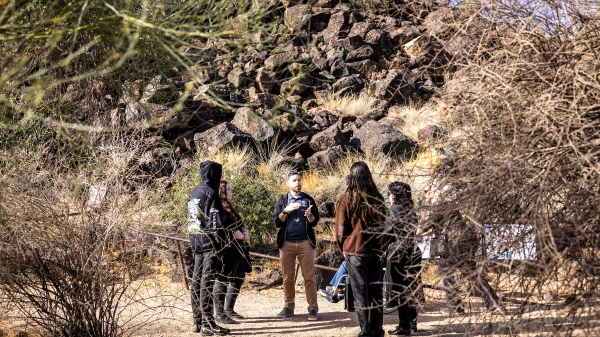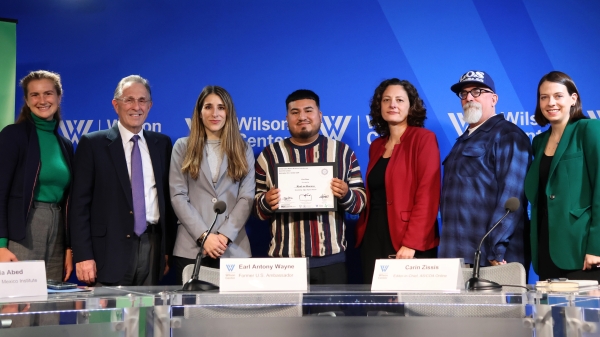When the Free Application for Federal Student Aid (FAFSA) opened on Oct. 1, a resource for Arizona high schoolers was born. Benji the chatbot, a collaboration between Arizona State University and community and educational partners throughout the state, has been the friend with whom more than 9,000 users have consulted in the past few months to receive answers 24/7 to questions about how and why families should fill out the FAFSA to receive funding for higher education.
The Project Benjamin initiative, named for the money ($100 bills) that filling out the FAFSA can save a family, is a $1 million grantee of the Schmidt Futures’ Alliance for the American Dream competition. All funded projects were charged with using artificial intelligence and data science to either increase the income or decrease the expenses of 10,000 middle class families by 10% by the end of 2020. Project Benjamin partners include College Success Arizona, Achieve60AZ, the Arizona Commission on Postsecondary Education, Helios Education Foundation, Mesa Public Schools, Maricopa Community Colleges, Be A Leader Foundation, AzCAN and AdmitHub.
The way Project Benjamin is tackling the challenge is by helping Arizona families access federal funding that is already available but is underutilized.
Heidi Doxey, project manager at College Success Arizona, said that annually $69 million in Pell funding for Arizona students is left on the table because no one applies for it, and the average federal funding award in the state after filling out the FAFSA is just shy of $10,000. That’s the tip of the iceberg in terms of federal and institutional aid that’s available; but it’s only available to students who fill out the FAFSA.
Since the average middle class Arizona family makes about $60,000 a year, taking advantage of the average funding award would increase families’ income or decrease educational expenses by well over 10% by just filling out that crucial form, and the technology will utilize students’ and parents’ prevalent use of mobile devices.
“The chatbot is something we think a lot of students will utilize and will be a great tool for both middle income families and also across the board. And that’s key, because the only way to access federal aid and institutional aid is through FAFSA,” Doxey said.
But the FAFSA can be intimidating to complete. Some of the most common questions Benji has received so far are “What is an FSA ID and where do I get one?”
An FSA ID is a username and password that students and parents need to visit a different site to generate. They both need one to cosign the form. It’s a confusing step and is, unfortunately, said Doxey, the first one.
Other common questions include “Where do I find FAFSA?” or “Where do I start?” or questions about the immigration status of the student or parent or whether parents without a Social Security Number can fill out the form.
Doxey said a huge part of the appeal is that Benji is an approachable way to ask these questions.
“People are concerned, and Benji is confidential,” Doxey said. “They don’t have to go to a counselor. … You can text this robot, who automatically responds with the correct answer.”
And if Benji doesn’t know the answer? He’ll find out and the answer will be added to his “brain” and will become accessible within his knowledge base for the next inquiry. Benji also can send notifications about relevant events and deadlines customized based upon who the user is: students, parents or educators.
That is one reason why Abraham Valencia, a senior at Westwood High School and a FAFSA peer coach for the school, likes the chatbot. “I like Benji. ... It’s a project still, and they have done a really good job with the AI and how it grows with the number of questions you ask,” he said.
The Project Benjamin team shares the same statewide goal as the Arizona FAFSA Challenge, which is to ensure that at least 52% of graduating seniors complete the form in 2020, which would be an increase of 5% over last year.
So far, 14 school districts have signed on as partners to promote the Benji chatbot tool and work to move the needle on FAFSA completion among Arizona high school students: Queen Creek, Mesa, Scottsdale, Marana, Maricopa, Peoria, Glendale, Phoenix Union, Florence, Gilbert, Higley, Chandler, Tempe Union and Yuma Union.
There is a lot of momentum around FAFSA completion among educators, and Benji has been a welcome tool to meet students where they are. Interacting with Benji doesn’t require anything more than a text message: Try it out by texting 602-786-8171.
“A lot of my students work right after school and do not have a lot of time to stop by our office and seek FAFSA help, so I just give them Benji’s card so they can ask questions on their own time,” said Bryan Pisetsky, Marana High School college and career counselor.
“They find this super convenient, and I think it is a large part of the reason our number of FAFSA completions has increased by about 5% compared to last year at this time,” he said.
School districts have also been spreading the word about Benji through peer mentors, marketing, counseling and events. At Mesa Public Schools, college and career coach Ben Fisher said they’ve jumped up 10 percentage points in completion in two years and are eager to build on that success with 27 peer coaches, about four seniors at every high school, who are trained to promote and support their peers to complete FAFSA.
“One of our objectives for our peer coaches is for them to use relevant technology to support students. One of those technologies is Benji ... A few of the peer coaches have said that they pull out their phone regularly and ask Benji a few questions and that Benji has directed them to the right place in order for students to complete their FAFSA,” Fisher said.
Fisher hears from students about the convenience and the barriers that Benji helps overcome. In Mesa schools, he said, it might be immigration status, or it might be students who are going on religious mission trips after high school and may not think the FAFSA is relevant to them, even though students can sometimes defer aid or scholarships for use when they return.
“For students who are college bound, it is breaking some of those barriers that are put up financially or even nonfinancially, just helping them get through that process,” Fisher said.
“A student who may be on the fence because of money may not realize how much money they can receive through the federal government through grants; when they fill out the FAFSA and see that there can be a switch to being college bound,” he said.
FAFSA completion not only opens up access to funding; it’s also tied to academic enrollment: 90% of high school seniors who complete FAFSA attend college directly from high school. The emphasis on both short-term income for families and long-term economic opportunities through education is part of what makes Project Benjamin so unique.
“Project Benjamin is already having a catalytic effect on students and families,” said Sylvia Symonds, associate vice president for Educational Outreach and Student Services at ASU. “Leveraging technology along with our collaborative partnerships, we are now able to scale FAFSA completion in Arizona. These efforts will open the door to economic opportunity for thousands of families.”
FAFSA applications are open now. For funding in the 2020–21 school year, complete your FAFSA as soon as possible; the last day to apply for funding for 2020–21 is June 30, 2021.
More Arts, humanities and education

Petroglyph preserve celebrates 30th anniversary with ancient, modern tales
The Deer Valley Petroglyph Preserve provides a beautiful walk through a pristine desert where chuckwalla lizards are as plentiful…

Kaleidoscope short film contest inspires powerful binational filmmaking in its second year
“We come to this country not to steal anybody’s jobs but to take advantage of the opportunities that the rest ignore. We’ve been…

ASU's Neal Lester reflects on life, death of poet Nikki Giovanni
When Neal Lester heard on Monday that poet and activist Nikki Giovanni had died, the news hit hard.Lester, the founding director…
